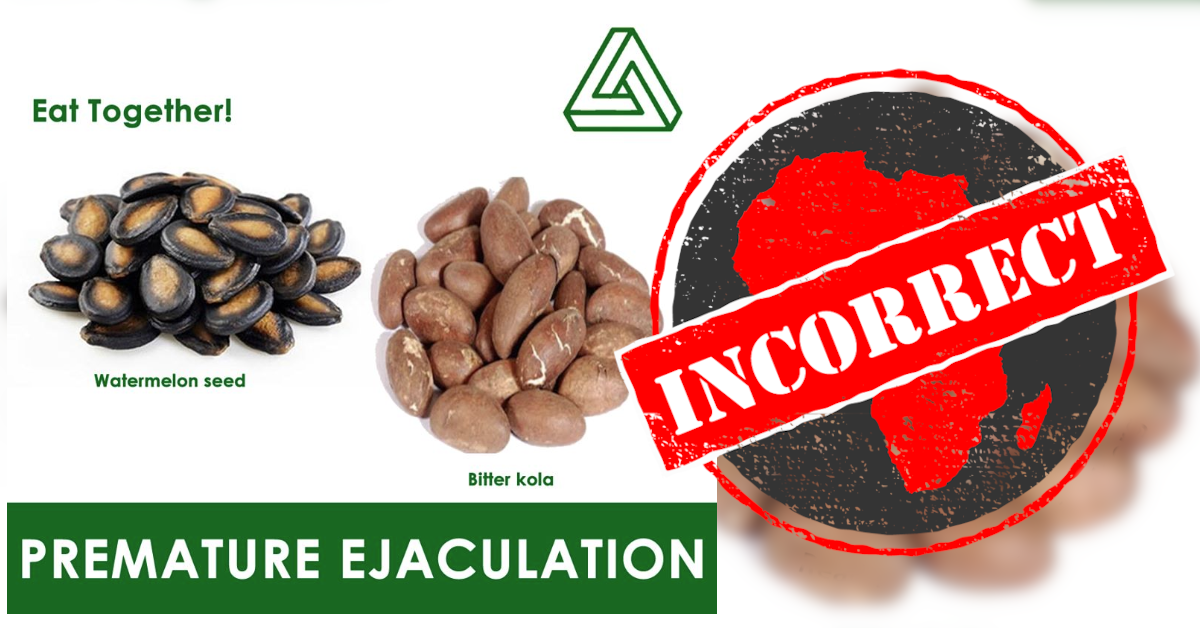A Facebook post claims watermelon seed and bitter kola, eaten together, can stop premature ejaculation.
Written like a doctor’s prescription, it reads: “Premature Ejaculation. Items: Watermelon seed and Biter kola. Dosage: 5 watermelon seeds ½ bitter kola. How to use: Eat together.”
The bitter kola plant (scientific name Garcinia kola) produces edible seeds used as a plant medicine in many parts of Africa. Watermelon seeds are safe to eat and highly nutritious, but usually spat out when eating the fruit.
But could eating the seeds together improve your sex life?

Premature ejaculation is when a man orgasms sooner than he or his partner would like during sex.
Africa Check asked Maureen Ebomoyi, a professor of physiology at the University of Benin in southwestern Nigeria, about the claim.
“It is not scientifically proven and has not been researched to be effective. I would advise anyone battling with premature ejaculation to see a physician,” she said.
Dr Oshiozokhai Eboetse Yama, a lecturer at the faculty of reproduction and endocrinology at Nigeria’s University of Lagos, told us that premature ejaculation could be caused by different factors, including psychological factors.
“This mixture may work in a healthy individual, but if there is an underlying hormonal problem, the mixture is not the direct cure.
“We advise the patient to see a physician who would prescribe a hormonal replacement therapy and also recommend supplements that could boost his hormones.” – Jennifer Ojugbeli
Written like a doctor’s prescription, it reads: “Premature Ejaculation. Items: Watermelon seed and Biter kola. Dosage: 5 watermelon seeds ½ bitter kola. How to use: Eat together.”
The bitter kola plant (scientific name Garcinia kola) produces edible seeds used as a plant medicine in many parts of Africa. Watermelon seeds are safe to eat and highly nutritious, but usually spat out when eating the fruit.
But could eating the seeds together improve your sex life?

See a doctor for premature ejaculation worries
Premature ejaculation is when a man orgasms sooner than he or his partner would like during sex.
Africa Check asked Maureen Ebomoyi, a professor of physiology at the University of Benin in southwestern Nigeria, about the claim.
“It is not scientifically proven and has not been researched to be effective. I would advise anyone battling with premature ejaculation to see a physician,” she said.
Dr Oshiozokhai Eboetse Yama, a lecturer at the faculty of reproduction and endocrinology at Nigeria’s University of Lagos, told us that premature ejaculation could be caused by different factors, including psychological factors.
“This mixture may work in a healthy individual, but if there is an underlying hormonal problem, the mixture is not the direct cure.
“We advise the patient to see a physician who would prescribe a hormonal replacement therapy and also recommend supplements that could boost his hormones.” – Jennifer Ojugbeli
Republish our content for free
For publishers: what to do if your post is rated false
A fact-checker has rated your Facebook or Instagram post as “false”, “altered”, “partly false” or “missing context”. This could have serious consequences. What do you do?
Click on our guide for the steps you should follow.
Publishers guideAfrica Check teams up with Facebook
Africa Check is a partner in Meta's third-party fact-checking programme to help stop the spread of false information on social media.
The content we rate as “false” will be downgraded on Facebook and Instagram. This means fewer people will see it.
You can also help identify false information on Facebook. This guide explains how.





Add new comment